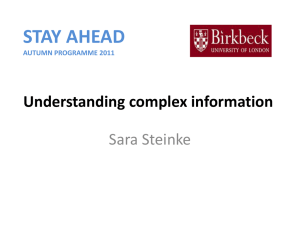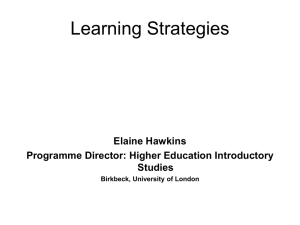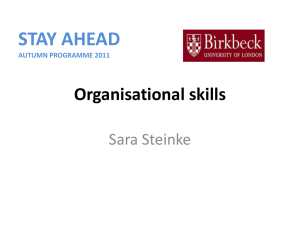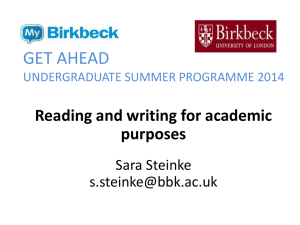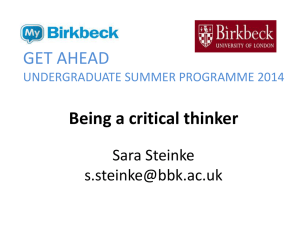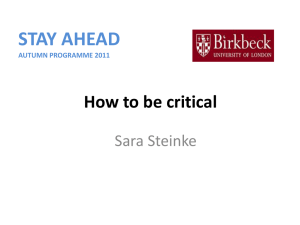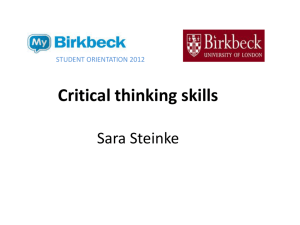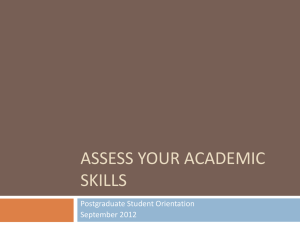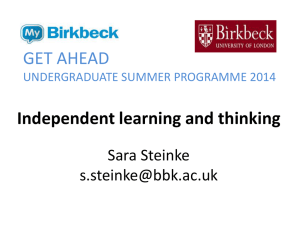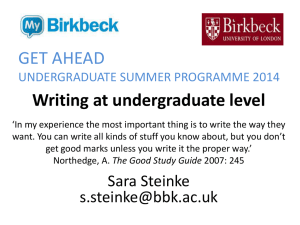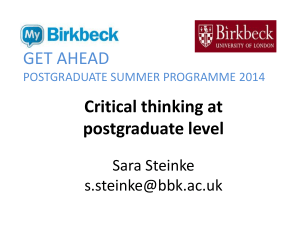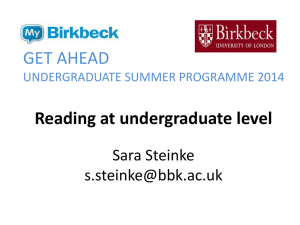Writing at university
advertisement
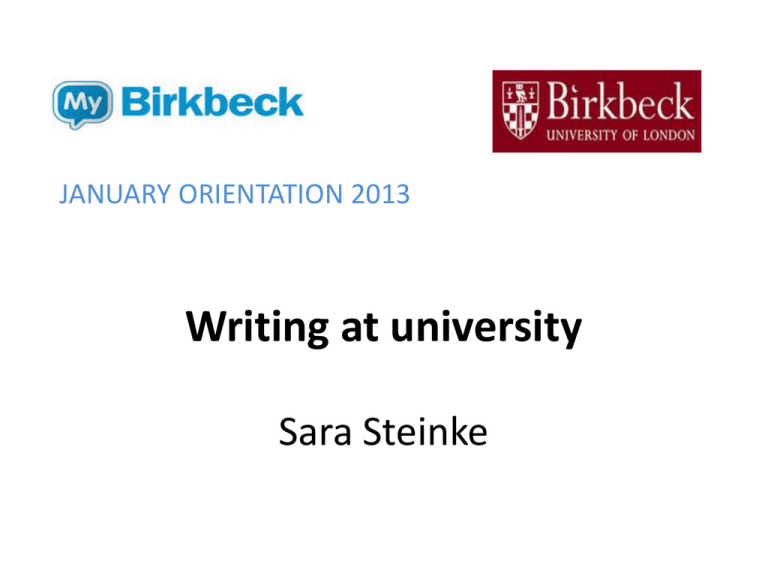
JANUARY ORIENTATION 2013 Writing at university Sara Steinke Aims of the session • Key features of academic writing – essays, reports, dissertations • Building on and developing your writing skills • Improving your reading skills Why write the way ‘they’ want? (Northedge 2007: 246) 1. Deepens your learning 2. Develops your writing skills 3. Doing yourself justice 4. Enables the reader to understand your point of view 5. Strengthens your powers of self-expression 6. Major medium through which your progress is assessed Challenging English Writing in an academic context may be challenging for one or several of the following reasons: • your previous educational experiences may not have prepared you for an academic writing style • you may have a specific learning difficulty such as dyslexia • you may not be a native speaker of English • you may not have had much practice at writing • you have learned a different academic style within another cultural context How to annoy your lecturers Christine Sinclair asked a group of lecturers from different subjects what really annoyed them about students’ grammar and language, and the following were their ten pet hates: Sinclair, C. (2007) Grammar: A Friendly Approach, Maidenhead: Open University Press/Mcgraw-Hill Education page 3 1. 2. Using apostrophes wrongly Confusing common words, for example there/their 3. Making spelling errors 4. Using informal language 5. Writing sentences without verbs 6. Making every sentence a paragraph 7. Not using paragraphs 8. Writing long convoluted sentences 9. Trying to write too pompously 10. Using run-on sentences/comma splices Check your academic English at http://www.bbk.ac.uk/mybirkbeck/ get-ahead-stayahead/achieve/your_English • Grammar http://www.bbk.ac.uk/mybirkbeck/ services/orientation/get-readyto-study-at-birkbeck • Punctuation interactive tutorial previous orientations sessions/tests on academic writing • Vocabulary • Spelling • Academic style Academic writing style • Use formal style • Writing style does not have to be complicated /elaborate • Be well organised and present ideas in logical order • Present objective analysis that is critical without being too positive or negative • Use clear precise language • Avoid emotive language Academic writing: key conventions • • • • • Do not use contractions or slang Use the terminology of your field Avoid the first (‘I’) and second person (‘you’) Define key terms you use in a particular way Include only ideas that are relevant to your argument and subject • Limit ideas to one per sentence/single point for each paragraph • Be kind to your reader – give reader clues (transition words, summaries) to let them know where they are in your argument • Use subheadings and sections What is wrong with this piece of critical writing? (Cottrell 2008: 209) Mount Pepe is going up – it’s going to take everything with it when it goes. And I mean everything – villages, farms, trees, the lot. It’s frightening to think of how powerful a volcano can be. Think of the damage they cause! Remember Pompeii and Mount Etna! What is right with this piece of critical writing? (Cottrell 2008: 209) In order to assess whether it is necessary to evacuate the villages on Mount Pepe, three main factors need to be taken into consideration. The first, and most important, of these is the element of safety. According to seismic experts currently working on the volcano, there is likely to be a major eruption within the next ten years (Achebe 2007) According to Achebe, the eruption is likely to destroy villages over a radius of 120 miles (Achebe 2008, p.7). What can I do to make my writing more academic? • check your academic English • attend free Academic Development Workshops offered by Centre for Learning and Professional Development (CLPD) at http://www.bbk.ac.uk/mybirkbeck/global/workshop_timetable ?orgunit=SSK • enrol for an one-term Academic Writing module http://www.bbk.ac.uk/mybirkbeck/services/facilities/support/ academic-writing-modules • note how the ideas in the books and articles that you read on your course are presented and expressed – reading and note-taking Academic VS Non-academic Reading In academic reading the reader is: In non-academic reading the reader is: • Active • Passive • Selective and interacts with the reading material • Reads from page one till the end • Has a particular question in his/her mind • Re-reads with a purpose • The author guides the reader through his/her narrative Recap of the session • Key features of academic writing • Building on and developing your writing skills • Improving your reading skills Useful reading for academic writing Cottrell, S. (2008) The Study Skills Handbook (3rd edition) (Palgrave Macmillan, London) chapter 8 ‘Writing for university’ and chapter 9 ‘Developing your writing’ Crème, P. (1997) Writing at University (Open University Press, Milton Keynes) Greetham, B. (2008) How to write better essays (2nd edition) (Palgrave Macmillan, London) Northedge, A. (2007) The Good Study Guide (Open University Press, Milton Keynes) chapter 10 ‘Writing the way ‘they’ want’ and chapter 11 ‘Managing the writing process’ Peck, J. & Coyle, M. (2005) Write it Right: A Handbook for Students (Palgrave Macmillan, London) Redman P (2001) Good Essay Writing (Sage, London) Rose, J. (2007) The Mature Students Guide to Writing (2nd edition) (Basingstoke, Palgrave) Useful websites for academic writing • online resources available on the Birkbeck Library website http://www.bbk.ac.uk/mybirkbeck/services/facilities/support/essay-writing http://www.bbk.ac.uk/mybirkbeck/services/facilities/support/writing-skills • Get ahead Stay ahead interactive tutorials http://www.bbk.ac.uk/mybirkbeck/get-ahead-stay-ahead/skills/writing-skills http://www.bbk.ac.uk/mybirkbeck/get-ahead-stay ahead/skills/structuring_writing • website supporting the Palgrave MacMillan study skills books http://www.palgrave.com/skills4study/studyskills/reading/essay.asp http://www.palgrave.com/skills4study/studyskills/reading/writing.asp • Useful listening http://www.palgrave.com/skills4study/mp3s.asp#tricks
